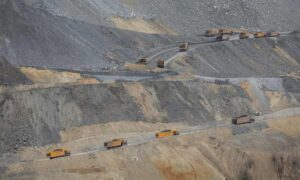
A UN-led panel of nearly 100 countries is to draw up new guidelines to prevent some of the environmental damage and human rights abuses associated with mining for “critical minerals”.
Mining for some of the key raw materials used in low-carbon technology, such as solar panels and electric vehicles, has been associated with human rights abuses, child labour and violence, as well as grave environmental damage.
Cobalt mining, for instance, has led to an upsurge in illegal labour and human rights violations, particularly in the Democratic Republic of the Congo. Copper mining has also led to severe pollution and environmental damage in some regions.
The global supply chain for other critical minerals, such as the rare earths needed for renewable energy production, is also increasingly a matter of concern for governments as they shift their economies to a low-carbon footing.
António Guterres, the secretary general of the UN, has gathered a panel of developed and developing countries with interests in the extraction and consumption of critical minerals with instructions to draw up a set of guidelines for the industries.
“A world powered by renewables is a world hungry for critical minerals,” said Guterres at the launch of the initiative on Friday. “For developing countries, critical minerals are a critical opportunity, to create jobs, diversify economies, and dramatically boost revenues. But only if they are managed properly.”
Addressing concerns that the scramble for raw materials had been disastrous for some, he said: “The race to net zero cannot trample over the poor. The renewables revolution is happening, but we must guide it towards justice.”
The guidelines drawn up by the panel will only be voluntary and are likely to rely heavily on big companies policing their own supply chains.
Laura Kelly, the head of sustainable markets at the International Institute for Environment and Development thinktank, said: “This is a good first step because at the moment, each country is doing its own thing in the rush to lock in access to critical minerals.
“But the fact that these will only be voluntary principles means there’ll be no enforcement mechanism for whatever guidelines are developed. In the end, voluntary guidelines are only as good as those willing to commit to them.”
She also noted that there was to be only limited input from Indigenous people, and that local people’s views must be taken into account.
The panel, which will produce the first draft of the guidelines ahead of the UN general assembly this September, will be chaired by South Africa and the European Commission.
Most of the world’s biggest producers are included on the panel, which comprises 21 countries plus the EU and the African Union, including Australia, Indonesia, Colombia and Chile. Many of the biggest consumers, including China, the US and the UK, are also onboard.
